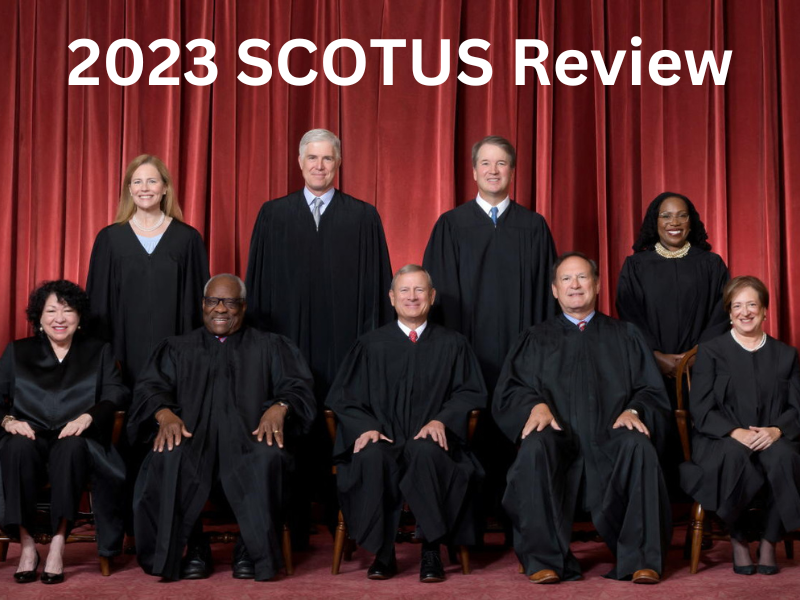This is part 2 of my discussion about the 2023 Supreme Court term. Part 1 is here. As always, questions and comments from readers are welcome via my email: [email protected].
1 Student Loan Forgiveness
Biden ET AL v Nebraska ET AL. This case dealt with the student loan forgiveness regulations issued by the Department of Education pursuant to the Higher Education Relief Opportunities For Student Act of 2003 (HEROES Act) and the issue was whether the regulations were constitutional and within the power of the Executive.. By a 6-3 vote, the Court held that the regulations were unconstitutional and not within the authority granted by Congress under the HEROES Act. The majority opinion was issued by Justice Roberts and was joined by Justices Thomas, Alito, Gorsuch, Kavanaugh and Barrett. Justice Barrett issued a concurring opinion (in which she brilliantly described how the major questions doctrine invoked in the majority opinion is not at odds with textualism).
Justice Kagan issued a dissent, which was joined by Justices Sotomayor and Jackson. The HEROES Act provides that the Secretary of Education “may waive or modify any statutory or regulatory provision applicable to te student financial assistance programs under Title IV of the Higher Education Act of 1963 as the Secretary deems necessary in connection with a war or other military operation or national emergency”. The HEROES Act further provides that the Secretary may issue such waivers and modifications only “as may be necessary to ensure” that “recipients of student financial assistance under Title IV of [Higher Education Act of 1963 affected by a national emergency] are not placed in a worse position financially in relation to that financial assistance because of the [national emergency]. Note that the HEROES Act was enacted shortly after the September 11, 2001 terrorist attacks on the World Trade Center and the Pentagon. President Trump had declared the pandemic as being a national emergency in 2020 and President Biden had affirmed that declaration in 2021.
Justice Roberts said in the opinion: “The text of the HEROES Act does not authorize the Secretary’s loan forgiveness program. The Secretary’s power under the Act to “modify” does not permit “basic and fundamental changes in the scheme designed by Congress”. Instead “modify” carries a connotation of increment or limitation and must be read to mean to change moderately or in minor fashion”. Justice Roberts noted that the Secretary of Education argued that Congress intended “to grant substantial discretion to the Secretary to respond to unforeseen emergencies”. Justice Roberts responded that the major question doctrine vests the power to respond and determine how to respond in Congress, not in the Department of Education.
In her dissenting opinion, Justice Kagan asserts that the text of the HEROES Act gives the Secretary of Education the “broad authority to give emergency relief to student loan borrowers, including by altering usual discharge rules”. Justice Roberts responded by citing then House majority leader Nancy Pelosi’s statement in 2021: “People think that [the President] has the power for debt forgiveness. He does not”. , President Biden himself said, while President elect, that it was “pretty questionable” that the President has the power to cancel student debt.
President Biden has already said that he intends to find a Plan B to achieve what the Court just ruled is beyond his power by relying on other Federal statutes. This is his middle finger to the Court and a further indication that he does not intend to abide by the law as enacted by Congress and interpreted by the Court.
2 National Labor Relations Act and Union Intentional Damage to Property
Glacier Northwest Inc. v International Brotherhood of Teamsters. This case involved a strike by the Teamsters in the State of Washington during which unionized truckers intentionally abandoned their trucks which carried concrete which caused the concrete to harden and become worthless. The Washington Supreme Court had held that this was incidental to a legally protected strike under the National Labor Relations Act and therefore Glacier’s claim for damages was denied. By an 8-1 vote, the Court reversed the opinion of the Washington Supreme Court.
The majority opinion was issued by Justice Barrett, which was joined by all of the Justices except Justice Jackson. Concurring opinions were issued by Justices Thomas and Alito. A dissenting opinion was issued by Justice Jackson. Justice Barrett, in her opinion, acknowledged that the Teamsters had the right to strike pursuant to the National Labor Relations Act but the union had the duty “to take reasonable precautions to protect their employer’s property from foreseeable, aggravated and imminent danger to the sudden cessation of work”.
Justice Jackson’s dissent rests on her view that the question of the right of the union to stop work when it did and the claim by Glacier to damages should be decided by the National Labor Relations Board and not by the courts.
This case is an important victory for employers with unionized work forces and a defeat for unions that use the intentional damage to the property of their employer as a bargaining tactic. The dissent by Justice Jackson essentially argued that the National Labor Relations Act overruled customary rights to sue for intentional damage to property when the damage occurred in the context of a strike.
3 Internet Platforms and Section 520 of the Communications Act
Gonzalez v Google and Twitter v Taamreh. Both of these cases were decided by a 9-0 vote. In both cases, the claim was based on a series of terrorist attacks by ISIS in Paris which killed 130 people, including Nohemi Gonzalez, a 23 year old US citizen. The day after the attacks, ISIS released a You Tube video and a written statement taking responsibility for the attacks. His parents and brothers sued Google, Twitter and Facebook under the Anti-Terrorism Act claiming that ISIS planned the attacks and coordinated the attacks by use of You Tube (which is owned by Google), Twitter and Facebook.
The Court said that the question presented is whether “an internet platform knowingly provides substantial assistance [to the terrorists] merely because it allegedly could have taken more meaningful or aggressive action to prevent such use”. The statute provides that a party is guilty of aiding and abetting under the Anti-Terrorism Act “who aids and abets, by knowingly providing substantial assistance, or who conspires with the person who committed [the] act of international terrorism”. The Court held that the plaintiffs “failed to allege that [the internet sites] did more than transmit information by billions of people- most of who use the platform for interactions that once took place via mail, on the phone, or in public areas” and that is not sufficient to support an “aiding and abetting” claim.
These cases once again demonstrate the effect of Section 520 of the Communications Act that shield “platforms” from liability for the acts of parties that post on their platforms and do not require that such “platforms” to inquire into the nature of posts.
4 Religious Freedom and Accommodation
Geoff v DeJoy. This case was decided by a 9-0 vote and dealt with a postal worker who asked the US Postal Service to accommodate his Christian faith by not requiring him to deliver mail on Sundays. The Court held that the employee was entitled to have accommodation made for his religious faith. The Court reversed a standard set in the 1977 case of Trans World Airlines v Hardison that employers are not required to accommodate employees religious practice if it imposes more than a “de minimis” cost on the employer. Justice Alito issued the opinion and said: “We think it is enough to say that the employer must show that the burden of granting an accommodation would result in substantial increased costs in relation to the conduct of the particular business”.
This case build upon increased protection for religious practice that the Court recognized in the 2022 term in cases protecting the right of a high school football coach to pray after games and the right of religious schools to participate in tuition voucher programs offered to public schools.





